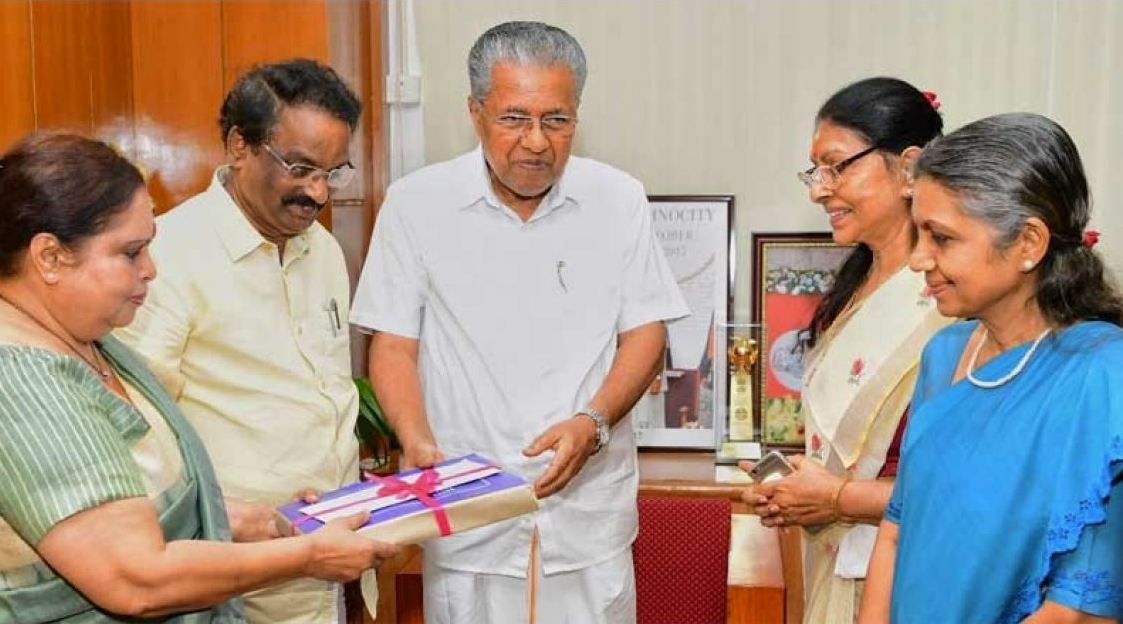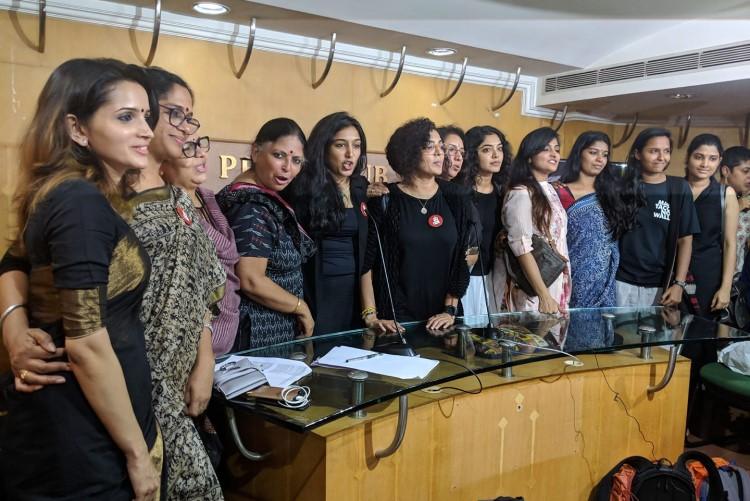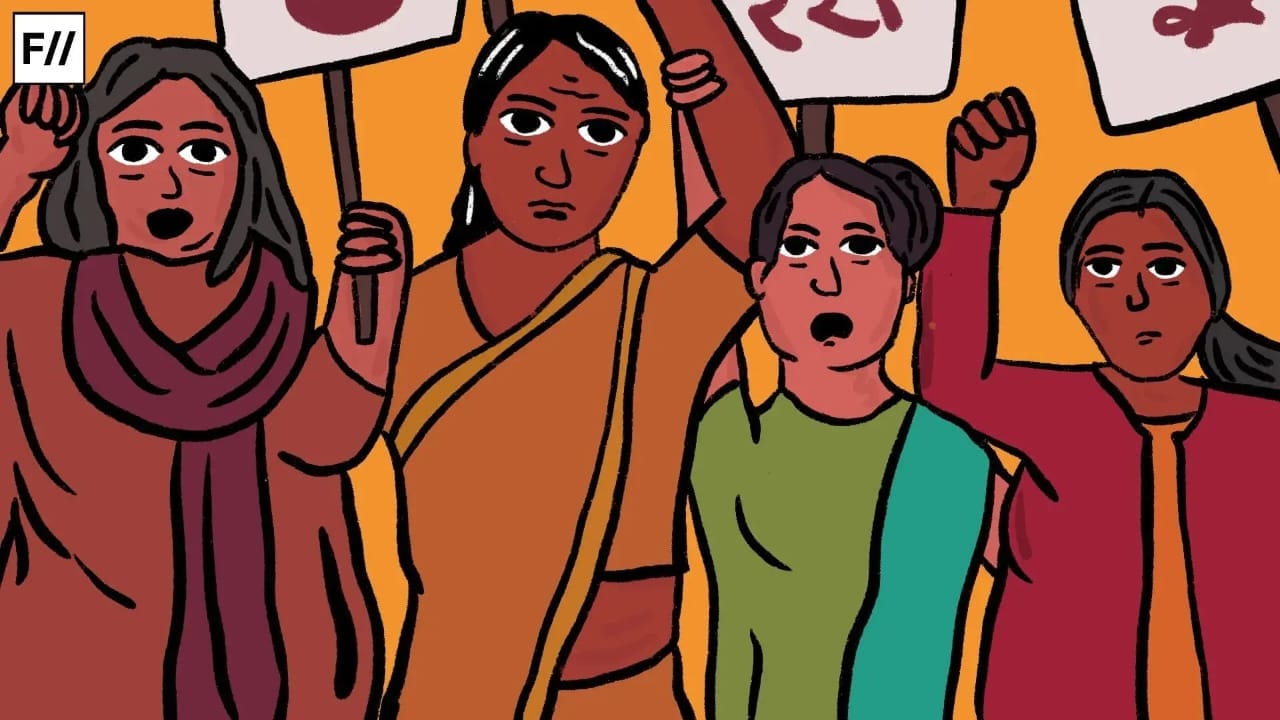Editor’s Note: FII’s #MoodOfTheMonth for May, 2022 is Gender at Workplaces. We invite submissions on the many layers of this theme throughout the month. If you’d like to contribute, kindly refer to our submission guidelines and email your articles to sukanya@feminisminindia.com
Women in Cinema Collective (WCC) is the first collective in Indian history that was formed by and for the women in the film industry. Though specific to Mollywood, a moniker granted to the Malayalam film industry, WCC is of historic importance in addressing the film industry’s systemic violence against women.
Last week, the WCC was in the news, owing to their disappointment in Kerala Chief Minister Pinarayi Vijayan’s government’s stance on the Hema Commission’s ambiguous report. A year before the #metoo movement started snowballing in the Indian film industry, a particular case of abduction and assault of a female actor in a moving car had installed a pioneering action toward women’s welfare in the entertainment industry, leading to the formation of the collective.
The birth of the WCC
In March this year, a video, of actor Bhavana Menon lighting a candle at the inaugural ceremony of the International Film Festival of Kerala (IIFK) and being greeted with a standing ovation, was all over the internet. Her comeback to the Malayalam film industry was confirmed with the announcement of the film ‘Ntikkakkakkoru Premondarnn’. It was an emotional moment for the industry and netizens alike.
A few months before, in January, she had taken to social media to talk about the arduous five years she had spent in the shadow of her past. The origin story took place in 2017 when a popular actor was abducted and assaulted in a moving car, near Kochi. The nameless faceless survivor made headlines across television and newspapers. Later, in an interview with Barkha Dutt, Bhavana mentioned that she had requested the media to omit her name. That did not mean she was saved from conjectures, and more importantly, the legal and emotional battle of survivorship.
After a long, arduous process of research and interviews, Hema Commission submitted its report to the Kerala Government in 2019. Events developed in quick succession, till the submission of the report. Two years passed, and a pandemic struck the state had little time for the welfare of an industry that was almost brought to its knees by the virus. Meanwhile, in an unprecedented move, in 2019 women film makers were granted a state budget of 3 crores by the Kerala Government, to address women’s welfare in the entertainment industry. But was this just a posturing of the government led by Pinarayi Vijayan, often lauded for supporting women’s empowerment?
She had filed an FIR immediately. Soon after, three out of the seven accused were nabbed by the police. The assault also brought forth the name of actor Dileep as an accused and alleged conspirator of the crime. In January this year, Dileep was accused of allegedly conspiring to kill a policeman who was part of the investigation team. After a messy journey in and out of jail, he is currently out on bail. But this moment of violence did not only start a conversation about workplace harassment, but also gave birth to the first collective of its kind, the Women in Cinema Collective.
In a matter of weeks, the incident brought together artists like Rima Kallingal, Parvathy Thiruvothu, Geetu Mohandas, Padmapriya Janakiraman and Revathi, director Anjali Menon, and editor Beena Paul among others, who met Pinarayi Vijayan, petitioning for swift action. They approached the government with issues of harassment and abuse faced by women in Mollywood, requesting interrogation into the existence of the ‘casting couch’ and gender discrimination in the industry.
Also read: P K Rosy: The Dalit Malayali Actress After Whom WCC Named Its Film Society| #IndianWomenInHistory

Justice Hema Commission
At the meeting with Pinarayi Vijayan, WCC was promised a committee that would be set up to study cases and take steps to prevent sexual abuse in the field. Soon after, under Justice K Hema, the three-membered Hema Commission was set up, constituting veteran actor Sharada and retired IAS officer KB Valsala Kumari.
After a long, arduous process of research and interviews, Hema Commission submitted its report to the Kerala Government in 2019. Events developed in quick succession, till the submission of the report. Two years passed, and the pandemic struck state had little time for the welfare of an industry that was almost brought to its knees by the virus. Meanwhile, in an unprecedented move, in 2019 women film makers were granted a state budget of 3 crores by the Kerala Government, to address women’s welfare in the entertainment industry. But was this just a posturing of the government led by Pinarayi Vijayan, often lauded for supporting women’s empowerment?

In 2021, the jubilation of the governmental support and action was marred by the long delay of justice. In July 2021, former minister of Cinema and MLA Thiruvanchoor Radhakrishnan raised the issue of impeding the tabling of the Hema Commission report, as it had exceeded the six-month deadline according to the Commission of Inquiry Act, in the Legislative Assembly. According to Chief Minister, the Hema Commission does not come under the Commission of Inquiry Act.
Thus, a panel was constituted without any legal powers, providing the required loophole to keep violence and abuse intact, keeping alive the facade of a work in progress.
The report
In May 2022, a meeting was convened between WCC members and the government to discuss the report. According to WCC, the report contains ambiguous and redundant recommendations. Even though the report continues to be in the dark, a half-page summary of the recommendations was handed out to the attendees of the meeting.
Issues like “equal remuneration” need a clear distinction in different pay slabs and how that equality is to be formalised in an industry with multiple job roles. Actor Padmapriya pointed out, “One of the points was about building two or more theatres in taluk, how is that connected with the safety of the women in the industry?”
There has been a constant push from WCC to publicise the contents of the commission report. Citing the privacy of the survivors, the Kerala government has steadily refused to bring the report into the public light. Director Anjali Menon points out that, since the Commission had assured them anonymity, it is a wasted effort for each survivor to have relived the abuse to narrate their stories only for the report to remain private
Owing to the original case, of the actor’s assault in a moving car, drivers are targeted separately. The fact-finding committee’s recommendations left attending members confused and disappointed. Another recommendation that raised eyebrows was, “ban on bad portrayal of women”. Cinema is a vehicle of storytelling – some fantastical, some realistic, some in-between. Angel-washing a particular gender portrayal on screen is neither the demand of the issue nor does it ensure safe working conditions for women.
On the flip-side of the “portrayal” coin lies a story of trolling, confirming the foundational patriarchy of the industry. In December 2017, actor Parvathy was faced with uncommon vitriol when she spoke about the misogynistic dialogues written for the character portrayed by megastar Mammootty in Kasaba. She was trolled by Mammootty die-hards and industry’s peers alike.
Days went by till Parvathy took matters to the police. A fan was arrested for cyber-bullying and Mammootty “finally” opened his trap with a lack-lustre comment about how Parvathy shouldn’t take controversies seriously. Five years later, the big Ms of Mollywood, Mohanlal and Mammootty, extended their support to the survivor of the abduction and assault, ten hours after the actor herself posted about it on her social media.

There has been a constant push from WCC to publicise the contents of the commission report. Citing the privacy of the survivors, the Kerala government has steadily refused to bring the report into the public light. Director Anjali Menon points out that, since the Commission had assured them anonymity, it is a wasted effort for each survivor to have relived the abuse to narrate their stories only for the report to remain private.
Former Chief Information Commissioner (CIC) Vinson M Paul cited a Supreme Court order denying information, citing privacy issues in a sexual harassment case. He argued that withdrawing information will not assure anonymity as circumstance and location might reveal identities. But RTI activist and advocate D.B Binu retorted that denying the report citing privacy is in violation of section 10(1) of the RTI Act that permits access to other parts of the report.
It has been easier for the government and the industry to delay justice as national media (the voices from Delhi) have maintained radio silence, save for a recent report by Newslaundry. In the meeting held in May, National Commission for Women (NCW) warned the government, that if the Commission does not release the report in the next 15 days they will launch an independent inquiry into the industry.
Action to push social justice beyond the internet
“Those who post on social media in support of the actress who was assaulted should clarify whether there is an internal complaint committee in their own production company. That is how we should stand with women,” said actor Parvathy, a member of WCC. Paying lip service takes little more than a few taps on one’s screen. What does it mean to action change?
WCC has been a lesson in the same. After 97 years of its existence, Mollywood got its first women’s collective constituted in 2017. The silent acceptance of abuse in the entertainment industry has led to the silencing of survivors, nurturing and rewarding toxic masculinity with more power. The political exactness of the survivor’s action, to step out of the dark and talk about her abuse in first-person, installs the meaning of survivor in its truest sense.
Reclaiming space or being a survivor are terminologies born out of digital sensitisation, but to put thought to action requires a world of conviction and power. In the wake of a horrible crime was the birth of India’s first women collective in cinema. If the report is released, it will be an unparalleled document testifying to the systemic power and gender abuse in the industry. The recommended actions can be better charted thereon.
Also read: The Malayalam Film Industry And AMMA Have Failed Women Everywhere
As Bollywood still huffs and puffs about the inconclusive apologist conversation around nepotism, Mollywood has been actively working towards legislative and judicial changes in approaching workplace abuse. Exploitation is not a disease afflicting Mollywood exclusively, but let the sleeping dog lie shall we?
The last few years’ worth of fighting by the WCC has created a blueprint for other industries across the country to ensure welfare committees to start addressing gender discrimination. The question is, what will be the threshold incident for other industries to get pushed into action? How many more survivors till we move forward?
Featured Image Source: The News Minute
About the author(s)
She/they is an editor and illustrator from the suburbs of Bengal. A student of literature and cinema, Sohini primarily looks at the world through the political lens of gender. They uprooted herself from their hometown to work for a livelihood, but has always returned to her roots for their most honest and intimate expressions. She finds it difficult to locate themself in the heteronormative matrix and self-admittedly continues to hang in limbo




